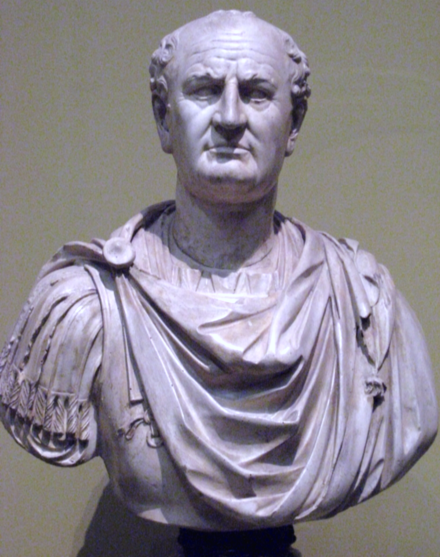Of course, that doesn't mean that the Senate thought that the Emperor had actually turned into a god. Or most other educated people, either. And so on this day in 79 A.D., the Emperor Vespasian was on his death bed and felt the end approaching. The historian Suetonius tells us that he said, "I feel myself becoming a god" (Vae, puto deus fio.) That's some quality snark right there, particularly from someone speaking their last words.
 |
| Haec est imago ab Wikipedia |
He was succeeded to the Imperial throne by his son Titus, who had the Senate deify his father. Titus, by the way, has left a big architectural imprint on the city of Rome: not only is the arch in his name one of the must-see sights, but he completed and dedicated the Coliseum.
5 comments:
Well sometimes after an Emperor died there was declared a Damnatio Memoriae, a damning of the memory. His images and inscriptions were chiseled off across the entire Empire. Of course coins - which always showed an Emperor in the best possible propagandic light - were exempt. Money talked even when it spoke Latin.
Regards the Coliseum it was built on the site of a water feature for Emperor Nero's Domus Aureus, the Golden House. Nero took up two of the Seven Hills to create history's biggest and grandest Party House. On contemplating its grandeur he said "Now at last I can begin to live like a human being".
TW
Well, Democrats do the same to any of their people that make it to high office, no matter how many times said people are accused and/or charged and/or arrested for bad things.
Which is funny, because most of the current democrats try to disavow any knowledge of God.
Beans: also, members of the other party are routinely deified in a negative sense, being declared literally the Devil himself. Saw that'n back in '00, and just about every year since. I think they were pulling that one for a long time before, but I hadn't really noticed.
Tim, I would very much like to hear one of Nero's musical compositions. Speaking of Damnatio Memoriae Emperors ...
I've always loved that quote and, thanks TW, the Neronian -- you can see why they killed him.
But my mind goes to the siege and sack of Jerusalem (see Eusebius, Sozomen etc). Two future God Kings, false ones to be sure, who unwittingly executed justice on behalf of one who was. Not a stone was left unturned.
I'd say there's a powerful and strange mystery in that.
Post a Comment